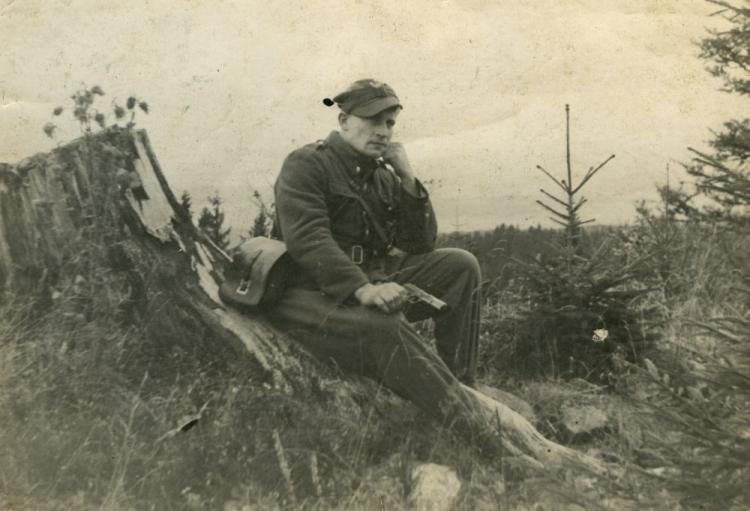Jewish leaders in Poland – including the country’s chief rabbi – have criticised the central bank for producing a commemorative coin honouring an underground officer whose unit has been accused of killing Jews.
The figure in question – Józef Kuraś, also known by his nom-de-guerre Ogień (Fire) – is regarded by many in Poland as a national hero for fighting against both wartime Nazi-German occupation and the postwar communist authorities. But some historians say he was also responsible for war crimes against ethnic minorities.
Last week, the National Bank of Poland (NBP) – whose president is a close associate of ruling party leader Jarosław Kaczyński – released a silver coin commemorating Kuraś as one of Poland’s “cursed soldiers” (żolnierze wyklęci/niezłomni) who resisted the introduction of communism.
Już dzisiaj można kupić w Oddziałach Okręgowych #NBP oraz na https://t.co/fd0a1oXO0S srebrną monetę kolekcjonerską o nominale 10 zł z serii „Wyklęci przez komunistów żołnierze niezłomni” – Józef Kuraś „Ogień”.
Więcej na ⬇https://t.co/evyD8WKCNo#numizmatyka #moneta pic.twitter.com/kOwgKsIWck— Narodowy Bank Polski (@nbppl) March 15, 2023
In response, 42 figures signed an open letter declaring that “as historians and representatives of Jewish organisations, we cannot remain silent when the National Bank of Poland…honours Józef Kuraś, a figure whose activities – even taking account of their unique historical context – are far from deserving of veneration”.
As well as Chief Rabbi Michael Schudrich, the signatories include: Zygmunt Stępiński, director of POLIN, Poland’s main Jewish museum; Sebastian Rejak, head of the American Jewish Committee’s Central Europe office; and Artur Hofman, president of the Social and Cultural Association of Jews.
Two leading Polish academics specialising in Holocaust history – Barbara Engelking, director of the Polish Center for Holocaust Research, and Jan Grabowski, a professor of history at the University of Ottawa – also put their name to the letter.
Two Holocaust scholars have won an appeal against a Polish court ruling ordering them to apologise to the relative of a man whom they said had been involved in the murder of Jews.
"Interference in academic research" is not a court's role, said the judge https://t.co/der3fKQ9E2
— Notes from Poland 🇵🇱 (@notesfrompoland) August 16, 2021
The signatories note that there was “drastic anti-Jewish violence” in southern Poland immediately after the Second World War and that “some of those crimes are the responsibility of fighters belonging to the unit led by Major Józef Kuraś”.
They quote one of Kuraś’s deputies, Jan Batkiewicz, testifying that “after I gave the order, everyone shot at the citizens of Jewish ethnicity” before taking food and clothing belonging to them. A number of such crimes, including against women and children, were committed by the unit, say the authors of the letter.
“Thousands of Poles during and after the war behaved properly,” they concluded. “But Józef Kuraś does not belong to them. Let us remember that this figure inscribed himself on the dark side of history.”
Poland's state remembrance institute was refused permission to hang a banner of one of the anti-communist "cursed soldiers".
He has been honoured by the current right-wing authorities, but is seen by some as a war criminal responsible for civilian deaths https://t.co/pLGlGs6xf0
— Notes from Poland 🇵🇱 (@notesfrompoland) March 3, 2021
Commemoration of the “cursed soldiers” often attracts controversy. Many are widely admired figures, such as Witold Pilecki, who deliberately had himself imprisoned at Auschwitz to gather intelligence and organise resistance in the camp. After the war, he was executed by the communist authorities.
But some, although commemorated by many on the right, are regarded by others as war criminals for their actions against ethnic minorities. Kuraś, whose unit is accused of crimes against Slovakians as well as Jews, is one such figure.
On its website, the Institute of National Remembrance (IPN) – a state body that is under government influence – defends Kuraś’s legacy. It argues he has been unfairly portrayed as a murderous antisemite due to the lasting effect of communist propaganda, which sought to sully the name of the cursed soldiers.
A room at the European Parliament has been named after Witold Pilecki, the Polish underground officer who deliberately had himself imprisoned at Auschwitz during WWII to gather intelligence and organise resistance at the camp https://t.co/bQHkJRDbp3
— Notes from Poland 🇵🇱 (@notesfrompoland) March 16, 2023
The IPN admits that “Jews died at the hands of the [Polish] underground”. However, this was not because they were Jews, but because “of their service in the [communist] organs of repression, Polish Workers’ Party or cooperation with the Department of Security”.
The institute also argues that, because so many Jews were present in the areas where Kuraś’s unit operates, “if [he] had really wanted to murder the Jewish population (as propagandists of the [communist] Polish People’s Republic claimed), the number of victims would have been much higher”.
However, other historians, including Jan Gross, Jerzy Wójcik and Maciej Korkuć (an IPN employee), have pointed to an incident in which Kuraś’s unit killed eleven unarmed Jewish Holocaust survivors seeking to flee to Palestine in 1946.
In 2006, a statue of Kuraś was unveiled in the town of Zakopane. The ceremony was attended by then President Lech Kaczyński, co-founder of the currently ruling national-conservative Law and Justice (PiS) party, which is led by his twin brother Jarosław.
A former far-right activist who has been pictured making straight-armed salutes has been appointed as head of a branch of Poland's state remembrance institute.
The decision has been criticised by the Israeli embassy. But the IPN has defended its appointee https://t.co/NpKpYj7ZSA
— Notes from Poland 🇵🇱 (@notesfrompoland) February 12, 2021
Main image credit; IPN

Daniel Tilles is editor-in-chief of Notes from Poland. He has written on Polish affairs for a wide range of publications, including Foreign Policy, POLITICO Europe, EUobserver and Dziennik Gazeta Prawna.




















